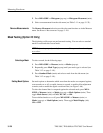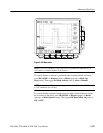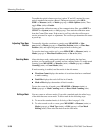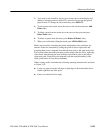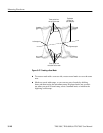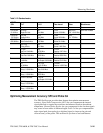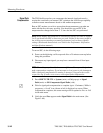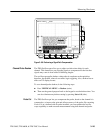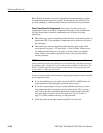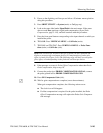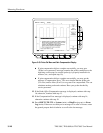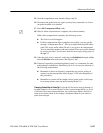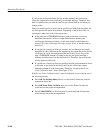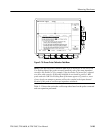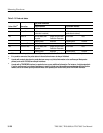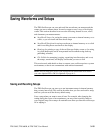
Measuring Waveforms
3–144
TDS 500C, TDS 600B, & TDS 700C User Manual
Run a Probe Cal anytime you wish to ensure that the measurements you make
are made with the most accuracy possible. You should also run a Probe Cal if
you have changed to a different probe since the last Probe Cal was performed.
Some Probes Cannot Be Compensated. Some types of probes can be gain
compensated, some can be offset compensated, and some can be compensated
for both. Some probes cannot be compensated at all. Note the following
restrictions:
H The oscilloscope cannot compensate probes that have an attenuation factor of
greater than 20X. If you attempt to compensate such a probe you will get an
error message.
H The oscilloscope cannot compensate probes that have gain and/or offset
errors that are too great (u2% gain and/or u50 mV offset). If these errors
are within specified limits for your probe, you may want to use another
probe. If they are not within specification, have your probe checked by
service personnel.
NOTE. Probe Cal is not recommended with the P6139A passive probe. This
probe typically has little gain and offset error, and therefore, the improvement in
performance after a Probe Cal is not worth the time needed to do the Probe Cal.
Probe Cal makes significant performance improvements when performed with
active probes or older passive probes.
To run a probe cal, follow the instructions regarding prerequisites below and then
do the steps that follow:
H If you are installing an active probe, such as the P6243 or P6245, there are
no prerequisites to performing this procedure. Start at step 1.
H If you are compensating for a passive probe with this procedure you must
first compensate the low frequency response of the probe. First, do steps 1
and 2 below, and then compensate the probe by following the instructions
that came with your probe. (Or see To Compensate Passive Probes on
page 3–6.) Then continue with step 3 of this procedure.
1. Install the probe on the input channel on which it is to be used.



